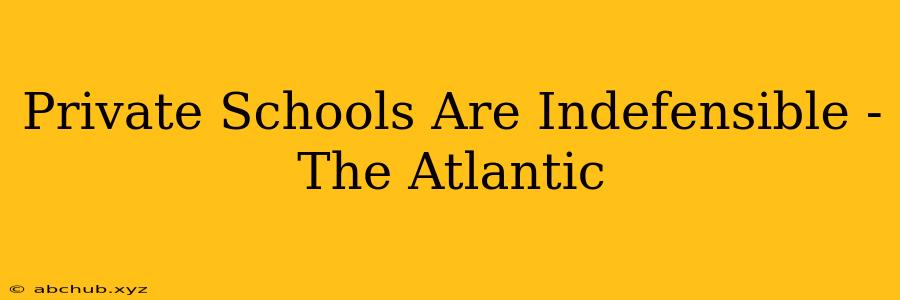Private Schools Are Indefensible: A Case for Equity and a More Just Future
The Illusion of Choice: Unmasking the Inequalities Embedded in Private Education
The idea of "choice" in education is a seductive one, a shimmering mirage that promises a path to excellence for those willing to pay the price. Private schools, with their carefully curated landscapes, gleaming facilities, and often exclusive admissions processes, represent this illusion in its most potent form. They are marketed as bastions of academic rigor, fostering a culture of success and nurturing the minds of future leaders. But this carefully crafted image hides a deeply troubling reality: private schools are fundamentally indefensible, perpetuating inequality and undermining the very foundation of a just society.
The starkest indictment of private education is its inherent exclusivity. The hefty tuition fees, often exceeding tens of thousands of dollars annually, act as an insurmountable barrier for families of modest means. This financial divide creates a segregated educational landscape where the children of privilege are granted access to the best resources, while those from less fortunate backgrounds are relegated to often underfunded and under-resourced public schools.
This disparity goes beyond mere financial inequality. Private schools are often accused of practicing discriminatory admissions policies, favoring students with high test scores and affluent backgrounds. The emphasis on standardized testing, while touted as a measure of academic potential, further entrenches existing inequalities, as access to expensive test preparation programs and tutoring services disproportionately benefits wealthy families.
The consequences of this educational apartheid are profound. The academic achievement gap between students attending private and public schools widens over time, with private school students consistently outperforming their public school counterparts on standardized tests and college admissions. This achievement gap translates into a widening socioeconomic gap, with graduates of private schools having a greater likelihood of securing high-paying jobs, attending elite universities, and achieving upward mobility.
The perpetuation of these inequalities through private education poses a serious threat to the social fabric. It breeds resentment, fosters a sense of entitlement among the privileged, and undermines the very notion of a meritocracy. The idea that individuals should succeed based solely on their hard work and talent is eroded by the reality of privileged access to resources and opportunities.
Beyond the Walls: The Societal Cost of Private Education
The detrimental impact of private education extends beyond the individual level. The existence of private schools diminishes the resources available for public schools, creating a vicious cycle of underfunding and lower quality education for the majority of students. The exodus of wealthy families from the public school system further exacerbates this problem, leaving public schools with a disproportionate number of students from disadvantaged backgrounds and fewer resources to address their needs.
The financial burden of private education also has far-reaching consequences. The billions of dollars spent annually on private school tuition represent a significant drain on the economy. This money could be channeled into public schools, providing access to quality education for all, fostering a more equitable society, and ultimately boosting economic growth.
Moreover, the social isolation fostered by private schools undermines the crucial role of education in creating a cohesive and tolerant society. By separating children from diverse backgrounds, private schools inadvertently contribute to the formation of echo chambers, limiting their exposure to different perspectives and hindering their ability to navigate a diverse world.
The argument that private schools offer a higher quality of education is often used to justify their existence. However, studies have shown that this claim is largely unfounded. While some private schools may excel in certain areas, the vast majority of public schools provide a comparable, if not superior, education, especially when considering factors such as class size, access to specialized programs, and teacher experience.
Reimagining Education: Building a More Just and Equitable Future
The solution to the problem of private education lies not in simply abolishing these institutions, but in creating a system of public education that is truly equitable and offers every student the opportunity to succeed. This requires a fundamental shift in our understanding of education, moving away from a system that prioritizes the needs of the privileged and towards one that truly values the potential of all students.
This vision requires a multifaceted approach, addressing the root causes of inequality in our society. Increased funding for public schools is essential, ensuring adequate resources for every student, regardless of their background. Investing in early childhood education can help bridge the achievement gap before it even begins. Expanding access to affordable housing, healthcare, and social services can help create a more level playing field for all children.
Furthermore, we must address the systemic biases ingrained in our educational system. This includes reforming standardized testing, promoting diversity and inclusion in teaching staff, and developing curricula that reflect the rich tapestry of our society.
The future of education must be one where every child has the opportunity to reach their full potential, regardless of their socioeconomic background. Private schools, with their inherent inequalities and detrimental impact on the social fabric, are a relic of a bygone era. It is time we abandon the illusion of choice and embrace a vision of education that truly empowers all students to succeed.
